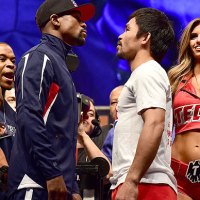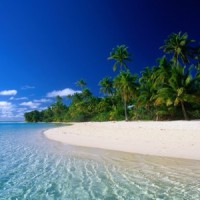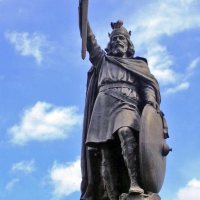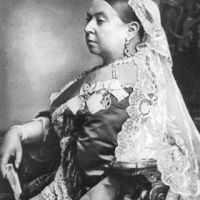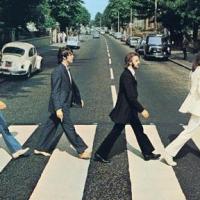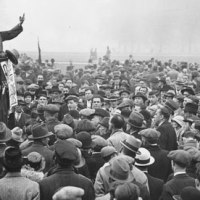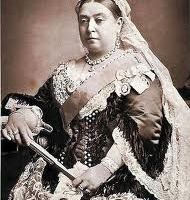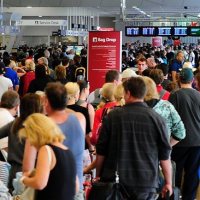Alfred…A Great Guy!
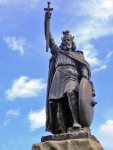 In 1899 the Victorians marked the 1000th anniversary of the death of Alfred the Great as the founder of England and saviour of its Christian faith.
In 1899 the Victorians marked the 1000th anniversary of the death of Alfred the Great as the founder of England and saviour of its Christian faith.
In the BBC Millennium Poll of 2000, Alfred didn’t make it into the top ten list of greatest Britons.
Sometime during those one hundred years the British lost favour with her most revered son.
Alfred wasn’t called “great” for nothing. He is the only British king with the title.
So what happened between then and now to change our views, or if not change them, merely ignore his achievements? Perhaps it’s just too long ago?
Alfred did however make it into the top 100, along with such luminaries as David Beckham, Tony Blair, Robbie Williams and even Boy George.
I’ll pause at this point to allow you a gasp of astonishment…..
Some sense prevailed in the top ten. Winston Churchill came out at number one, followed by Isambard Kingdom Brunel, Princess Diana, Charles Darwin, William Shakespeare, Isaac Newton, Elizabeth I, John Lennon, Horatio Nelson and, in 10th place, Oliver Cromwell.
Bearing in mind that the poll was conducted 16 years ago, it’s possible that the nation had an unhealthy dose of celebrity worship and collective amnesia.
It was only three years after the death of Diana; the country was still euphoric basking in the afterglow of a new labour victory, and the nation had yet to be embroiled in the war on terror.
Although Tony Blair didn’t make it into the top ten he did make it into the top 100. If the poll was taken today, it’s highly unlikely he (and many others) would get a look in. The highest ranked living person at the time was Margaret Thatcher, coming in at #16.
60 of the top 100 were alive during the 20th century. Hence the poll was severely flawed for it was indicative of contemporary individuals and populist history. Surely Alfred was greater than John Lennon? Indeed he was, but he died in the 9th century, and not the 20th; nor was he a famous singer/songwriter. Imagine that!
Twelve years after the poll, both Churchill and Brunel played prominent roles in the opening ceremony at the London 2012 Olympics, and both coincidently topped the millennium poll of 2000, so perhaps there is some justice attached to it.
Back to Alfred the Great (those of you who have lost interest may leave now). Herewith follows a compact history lesson from a Bardy view:
When the Roman’s left Britain in AD 410, over 300 years of relative peace, stability and prosperity left along with them.
Her empire was under attack, Rome was in trouble and the legions needed to consolidate and attempt to fend off the vandals and barbarian hoards. For Britain, what followed was a period of substantial unrest, and is known today as the Dark Ages. It lasted for several hundred years, and England as we know it today did not exist. It became a place divided and ruled by feudal chiefs with a hotchpotch of kingdoms, the most powerful being Northumbria, Mercia, East Anglia and Wessex.
Wessex was the most powerful, and during the rules of Egbert (802-839) and Aethelwulf (839-858) it expanded to include most of the land south of the River Thames, although not the Mercian controlled area of London. It was
during these periods that England was under constant raiding parties from the Vikings and Norsemen of Scandinavia.
In 865 the Vikings landed with force and within ten years subjugated the kingdoms of Northumbria, East Anglia and Mercia. Wessex was the next in line.By this time Alfred’s elder brother Ethelred was King of Wessex, and together they confronted the invasion of Wessex in 871. But they failed to prevent the advance and during the battle Ethelred was killed. Wessex was the last surviving Anglo-Saxon domain, and if it fell, then the land would be completely ruled by the Vikings.
Alfred took the throne, and through bravery and intelligence, through methods of tactics and guerrilla warfare, eventually prevailed.
He became an honourable and wise king, uniting the kingdoms, constructing the country’s first navy, instigating law and order, and promoting education, with particular emphasis on the English language, art, culture, and successfully creating – out of the Anglo-Saxon diaspora – the nation of England.
That’s why he is known as Alfred the Great.
Perhaps if a new poll is taken, he can take his rightful place along with Churchill, Elizabeth I, and Nelson as one of the nation’s top ten greatest Britons.
